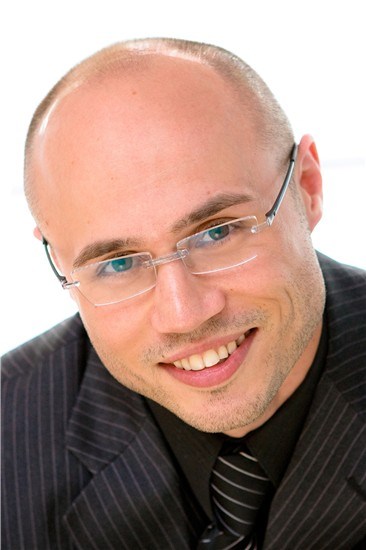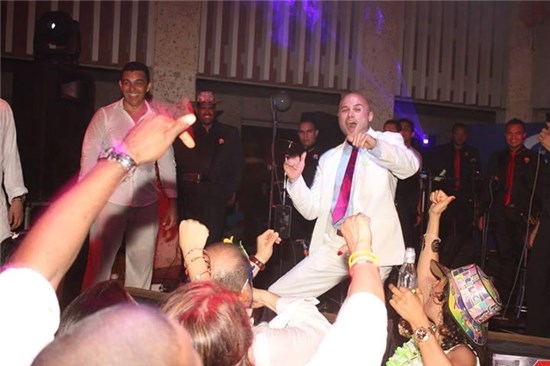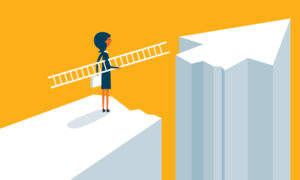By Justin Bazan, OD

March 11, 2015
SYNOPSIS
Optometric conferences are fun, but costly in time and money. Plan well for a payoff in practice improvements and career advancement.
ACTION POINTS
TRY NEW CONFERENCES. Don’t be afraid to try conferences as far away as South America and Europe.
ALLOW FOR IMPROMPTU MEETINGS. Expect–and welcome–interruptions to your “set” schedule, using social media to facilitate quick, on-the-fly meetings.
E-CAPTURE CONTACT INFORMATION. “Friend” new contacts on Facebook and other sites, immediately e-mail them or take a photo of their business card with your phone.
Optometric conferences and meetings can be a drain on your time and money–unless you set goals and a plan to make the most of your participation. Here is how I reap the greatest reward from the optometric events I attend.
Nine Steps to Optimize Your Next Conference
1. Strategize conference attendance based on your greatest needs (CE, product shopping, networking).
2. Create a plan for what you want to accomplish during the meeting, but be flexible enough to take advantage of opportunities that occur while there.
3. Prior to attendance, check out the event’s social media pages to enhance participation.
4. Utilize Facebook to set up meetings at the event and to see who else is “nearby.”
5. Plan to take advantage of “must see” opportunities in cities where the event is being held.
6. Seek out opportunities to be a conference speaker.
7. Bring along or send staff.
8. Capture contact information from new friends by adding them to Facebook on the spot or at least by taking a picture of their business card.
9. Implement new ideas when you get back to the office.
Map Out Which to Attend (Keep Open Mind)
Most years you will find me at SECO, VEE, VEW and AOA. I’ve been lucky to have been asked to participate in quite a few events for various industry entities.
These conferences have me packing my suitcase full of many different hats: advisory boards, consulting gigs, board meetings, continuing education, lecturing, networking, equipment and product shopping. There are typically a few purposes for me being there.
Conferences and events all have different reputations and flavors. What they are, and whether each one is worthwhile, I will leave up to you to find out! I challenge you to break out of your typical conference pattern, and in 2015, go to all new ones. I would like to remind my colleagues that there are many wonderful conferences and events in places far from your home location and conventional expectations. For example, one of the most amazing conferences I have ever been to was La Federación Colombiana de Optómetras (FEDOPTO). I’m really looking forward to going again. I’ve also decided that this is the year for me to head across the pond and do The British Contact Lens Association (BCLA) conference in the UK.
Get Doctor to Cover You When Away
I used to care a lot more about what I would “lose” if I was away from the office. I don’t care as much anymore. I’m lucky to have a fantastic associate doctor who picks up my slack while I’m away. If the option of handing off to an associate isn’t open, I will usually get a fill-in doctor. If all else fails, I just go without doctor coverage, and I don’t sweat it. I’ve never been to any conference and come home with the sentiment of it not being “worth” it . The intangibles you get by being there have always proven to be of high value. Optometry has many smart people. You can get to know a lot them at these conferences and events. You introduce yourself to a patient hopefully a dozen or more times a day. Get out there and apply that skill to your colleagues. Go shake some hands. Say hi, and the next thing you know you will be networking your way to a more successful practice.
Leave Room For Impromptu Meetings
I go with the flow. My set plans never seemed to be all that set, so I stopped making them. I like to say I have a loose agenda. Of course, if there is an absolute obligation, then I have it on my Google calendar and I will be there. If it’s not on my Google calendar, it doesn’t exist. Getting sidetracked and distracted isn’t a bad thing. I’ve missed scheduled classes to have dinner with a colleague. The result? I probably don’t know as much about whatever disease the lecture was on, but the ideas that were shared and discussed between us sure were valuable….as was the relationship building that can really only take place face to face.
I know that sleep is the lowest priority for me while at a conference or event. A typical schedule for me is industry meeting in the morning, classes in the afternoon, networking dinner, then socializing. I’ve always been a work hard, play hard kind of guy. I’m not hugely into the tourist-y stuff, but I will visit attractions at least once that are a “must see” in a city I’ve never visited before.

Dr. Bazan at a party after hours at the La Federación Colombiana de Optómetras (FEDOPT0). Dr. Bazan recommends making as many connections as possible at events, capturing those contacts via social media, and staying open to any impromptu meetings–or social opportunities–that may arise.
Utilize Social Media to Enhance Participation
Most events have social media pages on sites like Facebook set up. The closer we get to an event, the more I notice about them in my Facebook page newsfeed. Students, please pay attention to conferences’ social media pages. They often will contain information on tons of free opportunities, and even how you can score a travel grant! For example, a few days ago the International Vision Expo page posted on Facebook information about their Student Expo Experience at the upcoming VEE.
My Facebook profile is set to the “public” setting and I check in on Facebook to most places I visit, so people tend to always know where I am. Even as conferences are taking place, I often have people messaging me on Facebook asking to meet up. I also will see who else is “nearby” on Facebook to facilitate impromptu meetings.
Seek Opportunities to Speak
Most conferences are looking for new talent. People get fatigued with the same talks given by the same people, year after year. Conference organizers and committees realize this, so they love it when they have hot new topics submitted to them, and even more so when it’s from somebody new. It’s very rare that the great speakers started out great. They may have been naturally good, but over time they learned to become great. If you want to become better at anything, including speaking, study it and then practice it. The more you learn and the more you do it, the quicker you will progress. There are tons of mini-opportunities to speak out there. Examples include your local optometric society meeting, the nearest optometry school (students love to hear from real-world doctors), an in-office lecture or a lecture at a local school. Simply take what you’re passionate about and contact these groups or institutions. Many conferences have links on their web sites for people to submit courses.
If you are lucky enough to have someone approach you and ask you to give a talk, simply say YES! and thank them. Figure the rest out later! You will be fine. Don’t let your nerves block your opportunity, as another may not come. Opportunity is funny like that…the more you say yes to things, the more opportunities seem to come.
I love when people tell me they took what I presented and used it to help them achieve their goals. Also, the act of developing the presentation is fun for me. There is a creative aspect that is immensely enjoyable for me. Giving presentations is fun and something I look forward to doing. For me, the more I research and present on a topic, the more of an expert I become on it. So, each speaking opportunity is also a learning experience for me.
Bring Along Staff
I have taken staff members to conferences and events. I bring opticians, optometrists and support staff to events and conferences. It’s always best when the event is paid for by an industry sponsor or it’s in your backyard, which minimizes travel expenses. However, I have no issues sending a person out of town on my dime if they explain to me why it’s a must and what they plan on learning. For example, my associate doctor will be attending the College of Optometrists in Vision Development (COVD) meeting, which she loves and always learns from. It inspires her and fuels her passion for vision therapy. If I wanted to put a dollar figure on what she gains from this conference, I can track the development of her vision therapy and pediatric vision bookings and revenue. I’m expecting, and will be looking for, positive trends in those areas.
Implement Ideas Gathered When Back at Office
The good ideas won’t leave you alone. They turn themselves into reality without any major motivation. Sometimes you need clarification on them, so I have learned that if they are coming from a new friend, to get their contact information on the spot. Most of the time it’s “let me add you on Facebook right now so we can keep in touch” or “I’ll shoot you an e-mail right now so you have my contact info.” If my thumbs aren’t in great shape, I will often just take a picture of their business card and e-mail them at a later time.
Related ROB Articles
Continuing Education: Avoid Procrastination–and Optimize!
Collaboration: Foster Productive Interaction with Peers
OD Peer Groups: Creativity Comes from Within and Without
Justin Bazan, OD, of Park Slope Eye in Brooklyn, NY, started his own practice cold. He speaks regularly on strategies for marketing your practice via social networks. Contact: dr.bazan@parkslopeeye.com



























